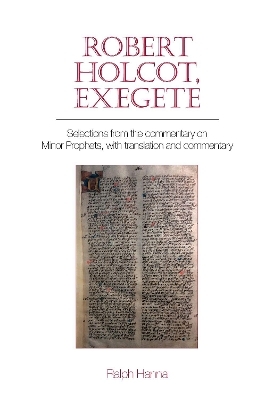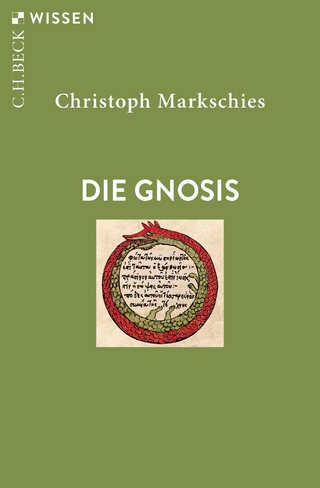
Robert Holcot, exegete
Selections from the commentary on Minor Prophets, with translation and commentary
Seiten
2021
Liverpool University Press (Verlag)
978-1-80085-973-9 (ISBN)
Liverpool University Press (Verlag)
978-1-80085-973-9 (ISBN)
- Titel ist leider vergriffen;
keine Neuauflage - Artikel merken
Holcot was read all over Europe as an exegete, an explicator of biblical texts, especially the Old Testament sapiential books.
This volume presents a selection, nearly a quarter of the whole, from Holcot's readings in the minor prophets, originally delivered in the 1330s as lectures in Oxford's Dominican studium.
Robert Holcot (d. 1349) was a Dominican friar, most prominently connected with the convent in Oxford where he became a Doctor of Theology. Holcot is perhaps most famous today, following an important discussion by Heiko Obermann in the 1960s, for his 'semi-Pelagian' theological views. In contrast to traditional Augustinianism, he believed that God granted salvation to individuals on the basis of 'bonum quod in se est', that is, on the basis of an individual's intention to do good, rather than any achievement. While historians of theology
know Holcot in these terms, his wide medieval reputation was rather different. Holcot was read all over Europe as an exegete, an explicator of biblical texts, especially the Old Testament sapiential books.
This volume presents a selection, nearly a quarter of the whole, from Holcot's readings in the minor prophets, originally delivered in the 1330s as lectures in Oxford's Dominican studium. In a commentary appended to the text, it uses these selections to offer a view of
exegesis, and of Holcot's strategies, that differs from customary scholarship on the topic. The commentary attempts to clarify the relation between Holcot's usually tacit discussion (a feature perhaps driven by the fact that the received text represents a reportatio or outline, not a stenographic transcription) and the biblical text at hand. It further addresses some argumentative features, principally Holcot's use of narrative and of imagistic distinctiones. The volume is fully annotated, with a facing-page translation, numerous references to analogous discussions elsewhere in Holcot (including his classic Super Sapientiam Salamonis), and full indexes of Holcot's biblical references, his parallel treatments, and his sources.
This volume presents a selection, nearly a quarter of the whole, from Holcot's readings in the minor prophets, originally delivered in the 1330s as lectures in Oxford's Dominican studium.
Robert Holcot (d. 1349) was a Dominican friar, most prominently connected with the convent in Oxford where he became a Doctor of Theology. Holcot is perhaps most famous today, following an important discussion by Heiko Obermann in the 1960s, for his 'semi-Pelagian' theological views. In contrast to traditional Augustinianism, he believed that God granted salvation to individuals on the basis of 'bonum quod in se est', that is, on the basis of an individual's intention to do good, rather than any achievement. While historians of theology
know Holcot in these terms, his wide medieval reputation was rather different. Holcot was read all over Europe as an exegete, an explicator of biblical texts, especially the Old Testament sapiential books.
This volume presents a selection, nearly a quarter of the whole, from Holcot's readings in the minor prophets, originally delivered in the 1330s as lectures in Oxford's Dominican studium. In a commentary appended to the text, it uses these selections to offer a view of
exegesis, and of Holcot's strategies, that differs from customary scholarship on the topic. The commentary attempts to clarify the relation between Holcot's usually tacit discussion (a feature perhaps driven by the fact that the received text represents a reportatio or outline, not a stenographic transcription) and the biblical text at hand. It further addresses some argumentative features, principally Holcot's use of narrative and of imagistic distinctiones. The volume is fully annotated, with a facing-page translation, numerous references to analogous discussions elsewhere in Holcot (including his classic Super Sapientiam Salamonis), and full indexes of Holcot's biblical references, his parallel treatments, and his sources.
Ralph Hanna is Professor of Palaeography (Emeritus) and Emeritus Fellow at Keble College, Oxford. He is a former Guggenheim Fellow, former Fellow of the Radcliffe Institute (Harvard University), and winner of the British Academy Sir Israel Gollancz Prize for English Language 2015. His many books with Liverpool University Press include Robert Holcot, exegete (2021), Malachy the Irishman, On Poison (2020), Richard Rolle: Unprinted Latin Writings (2019) and Editing Medieval Texts (2015).
| Erscheinungsdatum | 06.08.2021 |
|---|---|
| Reihe/Serie | Exeter Medieval Texts and Studies |
| Verlagsort | Liverpool |
| Sprache | englisch |
| Maße | 163 x 239 mm |
| Themenwelt | Geschichte ► Teilgebiete der Geschichte ► Religionsgeschichte |
| Geisteswissenschaften ► Sprach- / Literaturwissenschaft ► Anglistik / Amerikanistik | |
| Geisteswissenschaften ► Sprach- / Literaturwissenschaft ► Literaturwissenschaft | |
| ISBN-10 | 1-80085-973-2 / 1800859732 |
| ISBN-13 | 978-1-80085-973-9 / 9781800859739 |
| Zustand | Neuware |
| Informationen gemäß Produktsicherheitsverordnung (GPSR) | |
| Haben Sie eine Frage zum Produkt? |
Mehr entdecken
aus dem Bereich
aus dem Bereich
Von den Anfängen bis zur Gegenwart
Buch | Hardcover (2022)
C.H.Beck (Verlag)
34,00 €
warum die Religionen erst im Mittelalter entstanden sind
Buch | Hardcover (2024)
C.H.Beck (Verlag)
38,00 €


